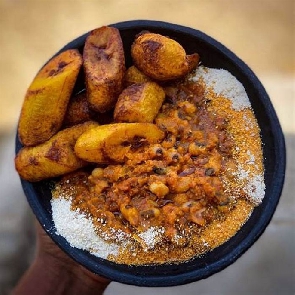Any slander against “gob3”, one of the foods that most Ghanaians love especially because of its affordability, is usually not tolerated among its lovers.
Beans and plantain which is popularly known as gob3 in Ghana is a meal made of cooked beans, ripe plantain, and any oil of preference i.e palm oil, coconut oil, etc.
Most people garnish it with gari, pear, or egg.
“Gob3” is a delicious meal that leaves eaters filled for a long time. However, issues have been raised in recent times about the meal’s healthiness.
According to health professionals, the best way to eat it is with unripe plantain.
A social media user with the Twitter handle @prof_pius detailed the various digestion processes the food goes through and what makes it unhealthy and harmful to the health of those who eat it.
He said cooking unripe plantain is healthy and can be eaten with beans, the problem only arises when it ripens and becomes a fruit.
According to him, cooking fruits can be poisonous.
“So, Fire turns the plantains’ sweetness, known as fructose to acidity. Not just acidic, but it’s highly acidic. When fruits are damaged by fire, they become poison to the body. Who suffers? The Liver! Here is the problem. Beans take between five to seven hours to digest properly and leave the stomach. While ripe plantains take just three hours.
“No fruit is digested in the stomach. But in the terminal Ileum. While beans digest in the stomach. Ripe plantain doesn’t need a pancreatic enzyme to digest. While beans do.
So, when they are combined, the ripe plantain tries to leave the stomach to travel to the terminal Ileum where It digests but the beans won’t allow it. This struggle goes on for a long which is unknown to you. Then, fermentation takes place,” Pius explained.
He said eating beans and ripe Plantain is a “Delicious Poison”.
SSD/NOQ
Ghana’s leading digital news platform, GhanaWeb, in conjunction with the Korle-Bu Teaching Hospital, is embarking on an aggressive campaign which is geared towards ensuring that parliament passes comprehensive legislation to guide organ harvesting, organ donation, and organ transplantation in the country.
Watch the latest edition of BizTech and BizHeadlines below:
Click here to start the nomination process for the 2023 GhanaWeb Excellence Awards
Health News of Saturday, 9 September 2023
Source: www.ghanaweb.com

















